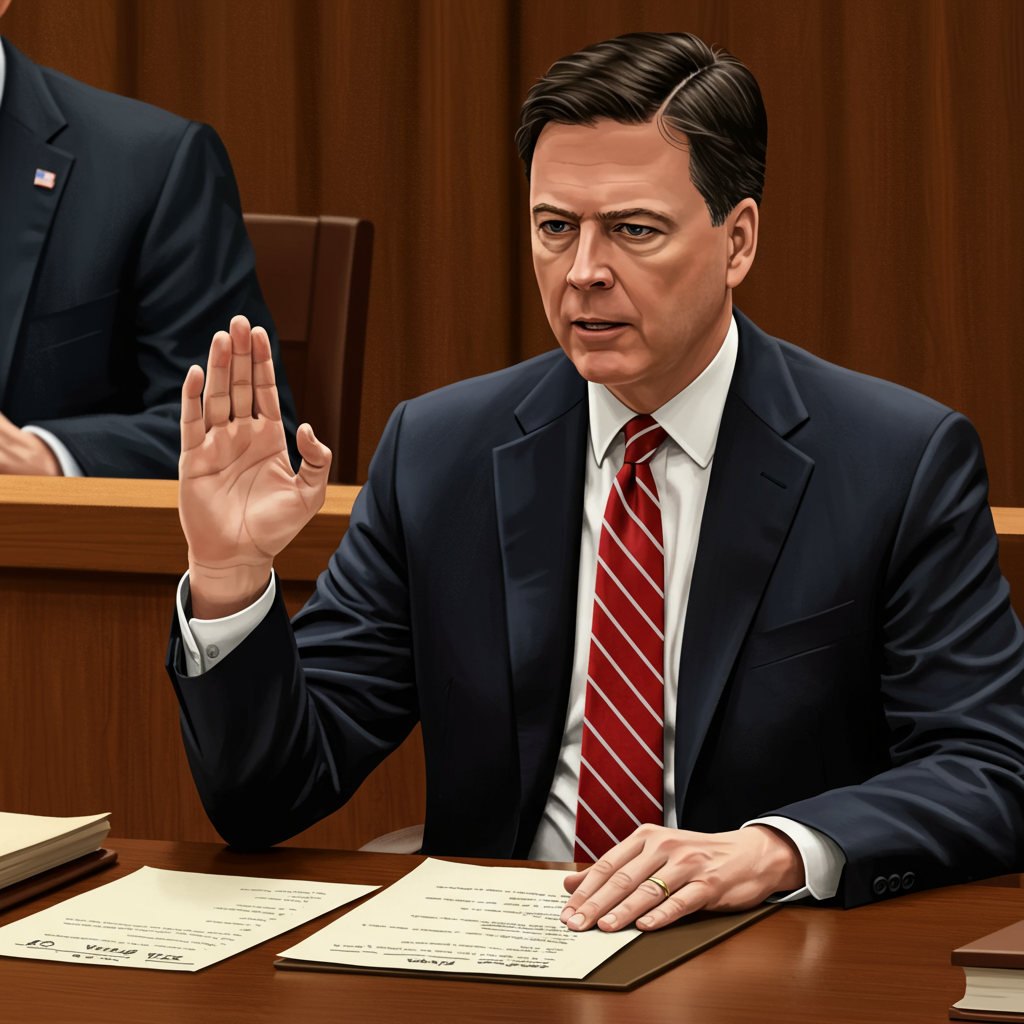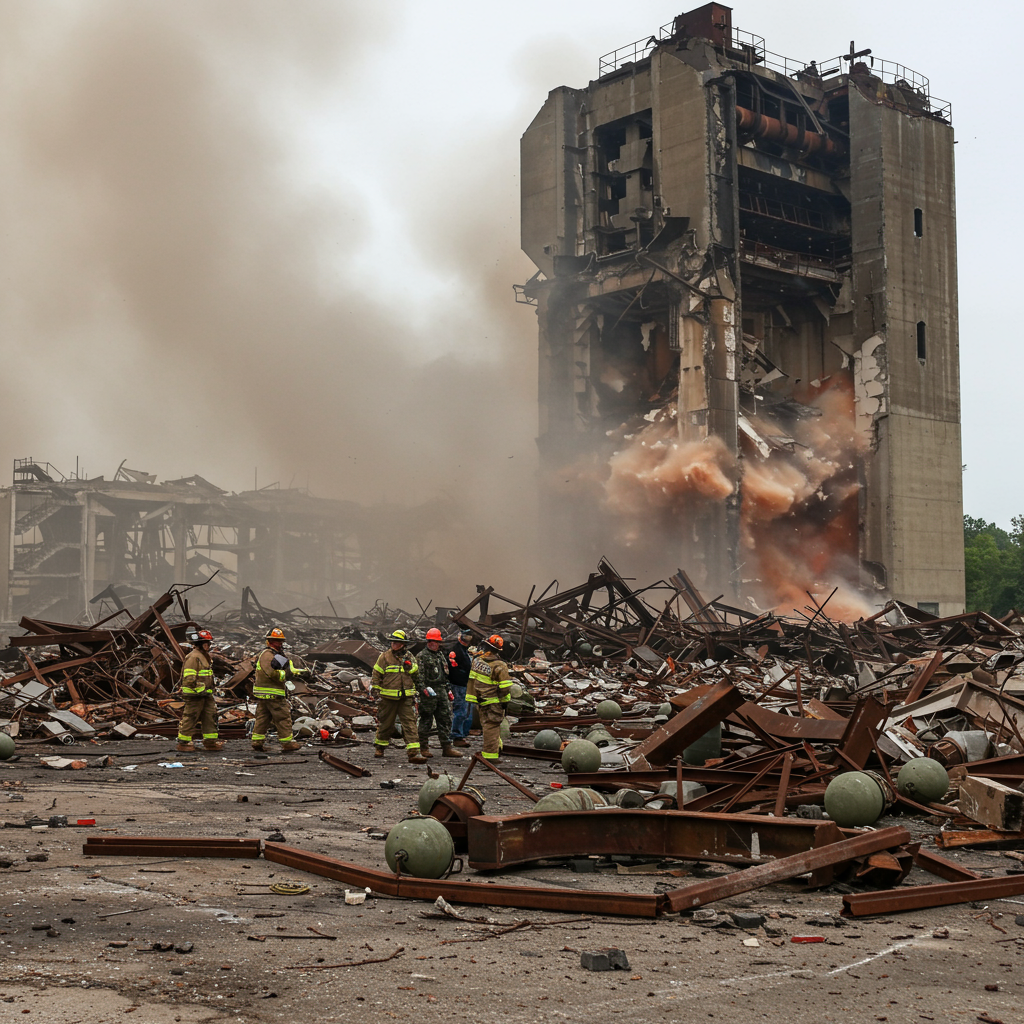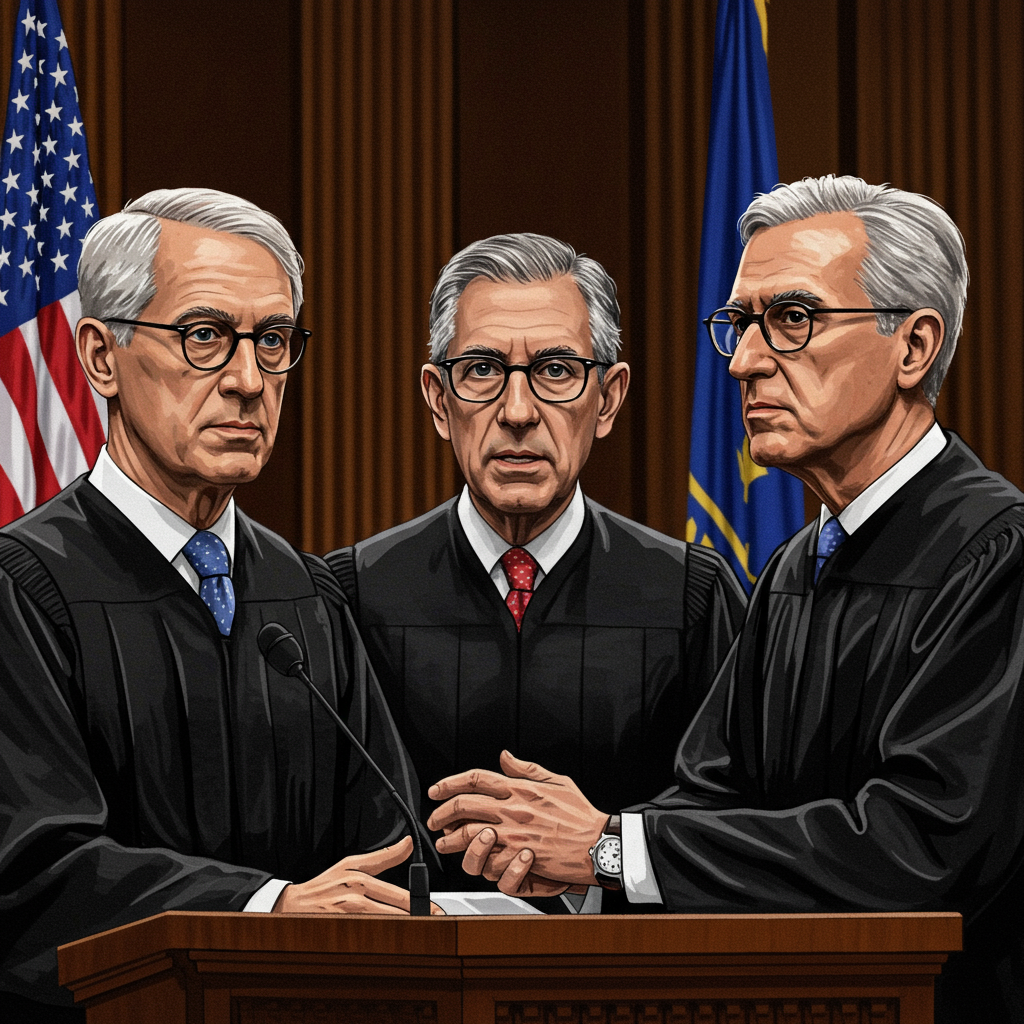Former FBI Director James Comey has officially pleaded not guilty to charges of lying to Congress, setting the stage for a high-stakes legal battle. His defense team is asserting that the prosecution is a politically motivated effort to target adversaries of former President Donald Trump. This case amplifies growing concerns about the potential weaponization of the Justice Department, raising questions about judicial independence and fairness. The unfolding legal drama, which began with Comey’s arraignment in Alexandria, Virginia, signals a contentious period ahead, replete with allegations of vindictive prosecution and challenges to prosecutorial legitimacy.
Comey’s Plea Ignites Political Firestorm in Virginia Courthouse
The federal courthouse in Alexandria, Virginia, became a focal point on Wednesday, October 8, 2025, as James Comey, former Director of the FBI, entered a not guilty plea. Comey faces criminal charges alleging he misled Congress five years prior. This brief yet historically significant arraignment lasted less than half an hour. However, it cast a long shadow, intensifying worries that the Justice Department may be operating at the behest of political retribution. The defense’s immediate intent to argue the case is politically motivated adds layers of complexity and public interest to an already charged atmosphere.
Allegations of Vindictive Prosecution Take Center Stage
Comey’s legal team wasted no time in challenging the legitimacy of the charges. Led by Patrick Fitzgerald, a long-time friend and former colleague from President George W. Bush’s Justice Department, attorneys signaled a vigorous defense. They plan to argue that the prosecution constitutes “vindictive prosecution.” This legal strategy aims to have the case dismissed before it even reaches a trial. Furthermore, the defense intends to challenge the very appointment of Lindsey Halligan, the prosecutor who filed the charges. Her swift placement into the role, just days before the indictment, raises serious ethical and procedural questions.
Controversial Appointments and Judicial Scrutiny
The indictment followed an extraordinary chain of events, prompting widespread scrutiny. The Trump administration reportedly forced out the prosecutor previously overseeing the Comey investigation. In his place, Lindsey Halligan was appointed. Her background as a White House aide and a former personal lawyer for President Trump is notable. Critically, she possessed no prior experience as a federal prosecutor. This unusual appointment immediately sparked concerns about political interference in the justice system.
The Prosecutor’s Peculiar Path to Indictment
Less than a week after her appointment, Halligan reportedly rushed to file charges against James Comey. This move occurred just before a crucial legal deadline. Reports indicate this rush happened despite warnings from other attorneys within the office. These internal warnings suggested that the evidence against Comey was insufficient for an indictment. Halligan was present at the prosecution table during Wednesday’s arraignment. Adding to the unusual nature of the case, the two prosecutors assigned to handle it are based in North Carolina, not the more prominent Eastern District of Virginia where the charges were filed. This geographic anomaly further underscores the unconventional circumstances surrounding the prosecution.
Unpacking the Indictment: Specifics and Open Questions
The indictment against Comey consists of two counts. It alleges he made a false statement and obstructed a congressional proceeding. Specifically, the charges claim Comey misled the Senate Judiciary Committee on September 30, 2020. During that testimony, he was asked whether he authorized any associate to serve as an anonymous media source. This was related to investigations into either Donald Trump or 2016 Democratic presidential nominee Hillary Clinton. Comey reportedly replied that he stood by earlier testimony, denying such authorization.
Unraveling the Charges: What’s Known and Unknown
Crucially, the two-count indictment does not identify the associate in question. Nor does it specify what information may have been discussed with the media. This lack of detail makes a comprehensive assessment of the evidence’s strength particularly challenging. Comey has consistently denied any wrongdoing since the charges emerged. He has publicly stated he looks forward to a trial. The judge has tentatively scheduled a trial date for January 5, though this remains subject to change.
The Judicial Landscape: Judge Nachmanoff and Political Criticism
The judge randomly assigned to Comey’s case is Michael Nachmanoff. He was nominated to the bench by President Joe Biden’s Democratic administration. Judge Nachmanoff previously served as a federal defender in Virginia. He is known for his methodical preparation and a calm demeanor in the courtroom. However, his background has already drawn the attention of former President Trump. Trump publicly derided Nachmanoff as a “Crooked Joe Biden appointed Judge.” Despite this political pressure, the judge indicated in court that he intends to push the case forward efficiently. He stated he would not permit unnecessary delays, emphasizing a commitment to a timely legal process.
A Politically Charged Bench: Scrutiny and Independence
The public criticism leveled at Judge Nachmanoff highlights the intense political scrutiny surrounding this case. The perceived impartiality of the judiciary is paramount in such high-profile proceedings. The judge’s resolve to maintain a swift timeline suggests an awareness of the need to manage the proceedings without undue influence. This situation underscores the delicate balance between legal procedure and political narrative in contemporary American justice.
A Broader Pattern: Targeting Perceived Political Adversaries
The prosecution of James Comey is not an isolated incident. It appears to be part of a larger pattern of investigations targeting individuals perceived as adversaries of President Trump. Reports indicate that other prominent figures, including New York Attorney General Letitia James and Senator Adam Schiff of California, are also reportedly under investigation. Both James and Schiff are Democrats, and their lawyers have vehemently dismissed these investigations as meritless. This broader context fuels the defense’s claims of vindictive prosecution, suggesting a systemic approach to silencing political opposition.
Collateral Damage and Wider Implications for Families
The personal toll of these events is also significant. Several Comey family members were present at the arraignment, demonstrating solidarity. Notably, his daughter, Maurene, was reportedly fired from her position as a federal prosecutor in Manhattan earlier this year. His son-in-law, Troy Edwards Jr., also resigned his job as a prosecutor. This resignation occurred in the Eastern District of Virginia — the very office that filed the charges against Comey — just minutes after his indictment. These personal impacts illustrate the far-reaching consequences of such politically charged legal battles on individuals and their families.
The Enduring Trump-Comey Saga: A History of Acrimony
The charges against James Comey represent the latest chapter in a deeply fractured relationship with Donald Trump. This contentious dynamic began shortly after Trump assumed office in January 2017. At that time, Comey, appointed FBI Director by President Barack Obama, was overseeing the explosive investigation into ties between Russia and Trump’s 2016 presidential campaign.
Years of Acrimony: A Timeline of Conflict
The relationship was fraught from its inception. Key moments included:
January 2017: Comey briefed Trump on the uncorroborated, sexually salacious “Steele dossier” that alleged compromising information about Trump.
Early Presidency: Trump reportedly sought Comey’s personal loyalty and asked him to drop an FBI investigation into his administration’s first national security adviser, Michael Flynn. Comey claims Trump also asked him to publicly state that Trump himself was not under investigation in the broader Russia inquiry, which Comey did not do.
May 2017: Comey was abruptly fired by Trump. Trump later admitted he was considering “this Russia thing” when making the decision.
Post-Firing: Comey’s dismissal was investigated by Justice Department special counsel Robert Mueller as a potential act of obstruction of justice.
2018 Memoir: Comey published “A Higher Loyalty,” a memoir painting Trump in a deeply unflattering light. He likened Trump to a “mafia don” and characterized him as unethical and “untethered to truth.”
Trump’s Retaliation: Trump repeatedly lashed out at Comey on social media throughout the Mueller investigation. He called Comey an “untruthful slime ball” and publicly suggested he should face charges for “treason,” accusations Comey dismissed as “dumb lies.”
Justice Department’s Perspective and Future Implications
The Justice Department reportedly views the indictment itself as a significant win, regardless of the eventual trial outcome. Trump administration officials are likely to frame any conviction as validation that the case was well-justified. Conversely, an acquittal or dismissal might be leveraged to support their long-standing contention that the criminal justice system is unfairly biased against them. This nuanced perspective highlights the political calculations at play, irrespective of legal merits. The case therefore carries profound implications for public perception of the Justice Department’s integrity and its independence from political influence.
Frequently Asked Questions
What are the core accusations against James Comey in this criminal case?
James Comey faces a two-count indictment alleging he made a false statement and obstructed a congressional proceeding. Specifically, the charges claim he misled the Senate Judiciary Committee on September 30, 2020. During this testimony, he denied authorizing any associate to serve as an anonymous source to the media regarding investigations into either Donald Trump or Hillary Clinton. The indictment, however, does not identify the alleged associate or detail the information supposedly shared.
Where is James Comey’s trial taking place, and what is its tentative start date?
James Comey’s arraignment took place at the federal courthouse in Alexandria, Virginia. This location, just outside of Washington, D.C., is also where his potential trial would be held. The judge overseeing the case has tentatively set a trial date for January 5. However, this date is subject to change as legal wrangling and pre-trial motions are expected to unfold in the coming months.
What are the main legal arguments James Comey’s defense team plans to use to dismiss the case?
James Comey’s defense team plans to employ two primary legal arguments to seek the dismissal of the charges. First, they intend to argue that the prosecution constitutes “vindictive prosecution,” asserting it is politically motivated and an unfair targeting of a perceived adversary. Second, they will challenge the legitimacy of the appointment of prosecutor Lindsey Halligan, citing her unusual background as a White House aide with no prior federal prosecution experience and the swift manner in which she was appointed and filed charges.
Conclusion
The not guilty plea by former FBI Director James Comey marks a pivotal moment in a case steeped in political controversy. His defense’s immediate challenge, accusing the prosecution of political motivation and questioning the prosecutor’s legitimacy, places the Justice Department under intense scrutiny. This legal battle, set against the backdrop of a long-strained relationship between Comey and Donald Trump, transcends individual charges. It embodies a broader national debate about the weaponization of legal systems and the integrity of federal institutions. As the proceedings move forward, the outcome will undoubtedly have lasting implications for American jurisprudence and political discourse.




